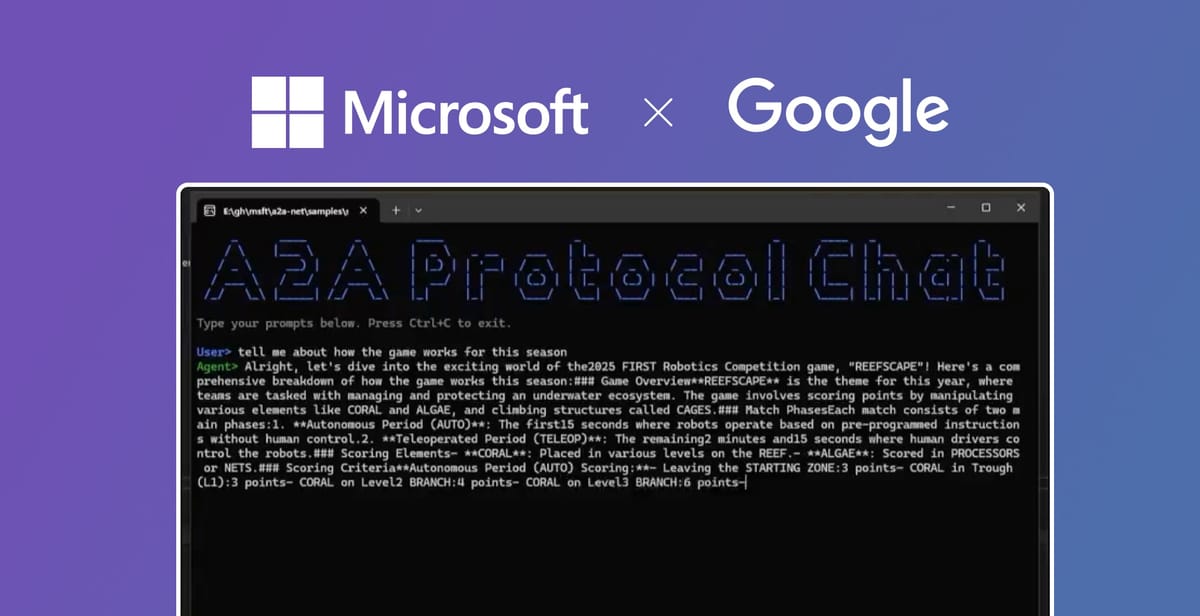Microsoft has officially formalized its partnership with Google to advance the Agent2Agent (A2A) protocol, a system designed to let AI assistants communicate and collaborate with each other regardless of who made them or where they're hosted. The initiative will integrate A2A capabilities into Microsoft's Azure AI Foundry and Copilot Studio platforms, potentially solving one of the biggest limitations of current AI systems: their inability to effectively work together.
Key Points:
- Partnership will embed Google’s A2A protocol into Azure AI Foundry and Copilot Studio.
- A2A enables secure, standards-based communication between AI agents across platforms.
- Enterprises gain guardrails (mutual TLS, Entra, audit logs) while avoiding vendor lock-in.
"In order for agents to truly be useful, over time they must be able to do more complex work on behalf of users," Microsoft stated in its announcement. "For that to happen, agents must be able to seamlessly interoperate with Internet services and with other agents."
The partnership represents a significant concession that neither tech giant can go it alone in the rapidly evolving AI landscape. As AI capabilities expand beyond simply answering questions to actually performing tasks, the need for standardized ways for these systems to interact becomes critical.
Microsoft revealed that developers at more than 70,000 enterprises now use Azure AI Foundry, with over 10,000 organizations adopting their Agent Service in just four months. Meanwhile, Copilot Studio has reached 230,000 organizations, including 90% of Fortune 500 companies. These numbers underscore the growing enterprise appetite for AI systems that can actually get work done.
The A2A protocol isn't just a technical specification — it represents a fundamental shift in how AI systems might operate in the future. Rather than isolated assistants with limited capabilities, A2A enables structured communication where agents can exchange goals, manage state, invoke actions, and return results securely. This could eventually lead to complex workflows spanning multiple specialized agents, similar to how humans collaborate across departments and organizations.
"Agentic computing isn't a trend—it's a foundational shift," Microsoft claimed in its announcement. "It changes how software is built, how decisions are made, and how value is created."
Microsoft has joined the A2A working group on GitHub to contribute to the specification and tooling, with a public preview in Foundry and Copilot Studio coming "soon." The company has already released a sample in its Semantic Kernel framework (available in Python) that demonstrates how two local agents can collaborate using A2A to plan travel itineraries and handle currency conversions.
Security and governance remain central concerns as these systems become more interconnected. Microsoft emphasized that every A2A call will pass through enterprise-grade safeguards including Microsoft Entra, mutual TLS, Azure AI Content Safety, and full audit logs — critical features for companies worrying about how agentic systems might behave when given more autonomy.
The Microsoft-Google partnership on A2A follows similar collaborative efforts, including contributions to the Model Context Protocol (MCP), suggesting a growing recognition that AI's future depends on interoperability rather than walled gardens. Whether other major players like OpenAI and Anthropic will fully embrace these standards remains to be seen.
For users, the partnership raises the tantalizing possibility that someday soon, asking one AI assistant to complete a complex task might trigger a cascade of specialized agents working together behind the scenes — communicating, negotiating, and delivering results that no single system could provide alone.

